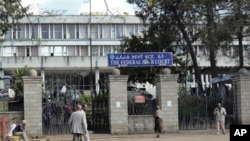Two Swedish journalists have told an Ethiopian court they were upholding the highest traditions of their profession when they were arrested in the company of rebels in the restive Ogaden region.
Ethiopia has accused the pair of supporting a terrorist group in a case which is attracting international attention.
Journalists Martin Schibbye and Johan Persson told a three-judge panel Tuesday they had gone to the insurgency-wracked Ogaden region to investigate the activities of a Swedish oil firm.
The firm, Lundin Oil, was accused of hiring as guards Ethiopian troops accused of human rights violations. Sweden's Foreign Minister Carl Bildt is a former member of Lundin's board of directors.
The two journalists were captured June 30, allegedly in the company of armed rebels of the Ogaden National Liberation Front, which Ethiopia regards as a terrorist organization. If convicted of supporting terrorists, the men face up to 15 years in prison.
During more than an hour of testimony, Schibbye said his contact with the ONLF was strictly professional. He rejected charges that he and Persson had been given weapons training by the rebels. He said a video introduced by the prosecution showing him holding a rifle had been recorded in a hotel parking lot in Somalia where he had interviewed a former fighter for the al-Shabab extremist group.
Veteran defense attorney Tomas Olsson is among more than a dozen Swedish observers, journalists and diplomats attending the trial. He says the two journalists appear to have answered the prosecution charges effectively.
"They have very clearly explained why they were in Ogaden, and it was the story about the oil companies' impact on the civilians' livelihoods, and that was the interesting part, and that they had no intention to take part in the armed conflict and that they didn't have any bias on any side, neither the Ethiopian side nor the ONLF side, and that's the core of the case."
Olsson says testimony before the court has established the defendants as highly-regarded investigative journalists with extensive experience in challenging and sometimes dangerous environments.
"They have studied the trafficking problem in the Philippines," he added, "they have studied the refugee situation in Kenya and Somalia, they have been doing reportage about the neo-Nazis in the United States and so on, so they have done reportage about actual and important things that have happened in our world."
Defendant Schibbye told the court that, last year, he spent 199 days covering conflicts in 16 countries.
The case is closely followed in Sweden because of the Bildt connection. But it is also attracting attention among press watchdog groups and other foreign correspondents.
Sweden's ambassador to Ethiopia, Jens Odlander, says many journalists with experience in combat zones have offered to testify, and two have flown in for the trial.
"Something very impressive is happening," Odlander says. "We had a mail sent out to a few contact people we know about, some journalists, and they forwarded it to maybe 800 plus foreign correspondents, mainly from Anglo-Saxon countries, and we had at least 20 people who were ready to come and witness, and very many people told us they would write a story about this case."
The two Swedes are among 10 journalists currently on trial in Ethiopia on terrorism-related charges. The other eight are Ethiopians, including five who have gone into exile and are being tried in absentia.












